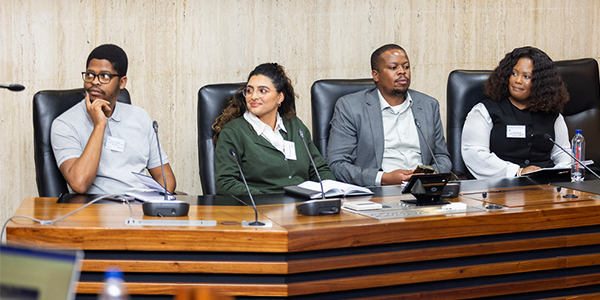Learning and Teaching conference reflects on #FeesMustFall and beyond
- Wits University
Speakers urge educators and universities to stay committed to creating equitable futures.

A three-day conference hosted by the Centre for Learning, Teaching and Development (CLTD) at Wits University, titled: Echoes of Protest, Visions of Praxis: Shaping Equitable Futures Through Learning and Teaching, provided a critical moment to commemorate, reflect and chart the way forward 10 years after #FeesMustFall and #RhodesMustFall.
The event aimed to create an inclusive and comprehensive platform for remembering and moving beyond theory to respond to the need for learning and teaching to advance transformation, to decolonise curricula and the academy more broadly, and to ensure equity and access to learning is prioritised. View the programme and watch the recordings.
Day one of the conference, on 9 September, set the tone with an opening panel chaired by Dr Bernadette Johnson, Director of the Transformation and Employment Equity Office.
The panellists included some of those who, 10 years ago, were students who would become leaders of a movement. These leaders recalled the moment that triggered the action - starting with them being asked to vote on a 10.5% tuition fees increase. They quickly realised that this was unsustainable and would have ripple effects of great disadvantage for the most vulnerable.
Their rejection of this proposal led to them organising and holding the protests and sit-ins in the then Senate House Building. Their actions amplified existing protests that had already begun taking root outside Wits. The demands moved beyond fee hikes and also called for decolonising the academy, and making it answerable for its complicity in propping up inequality and economic and social injustice. The movements that would include #RhodesMustFall and others would culminate as a watershed for the country.
On this panel were Thato Mokoena, a researcher and development practitioner working in education, youth development, and public policy; Omhle Ntshingila, project coordinator at the Right2Protest Project, Shaazia Ebrahim who is a digital communications specialist at the Climate Justic Coalition and Zama Mthunzi who is an activist and campaign co-ordinator.
The former students reflected on their memories from a decade ago. But they focused too on how being at the centre of the #FeesMustFall movement left distinctive imprints on them. They spoke of a sense of lingering trauma, a sense of unfinished business, and the feeling of dis-ease of how some trade-offs from 10 years ago remain the status quo.
For Ntshingila, one clear remnant of this is the securitisation of university campuses. Now, as part of Wits staff, she said: “After #FeesMustFall the whole university life changed on campus - how students navigated their politics, how students navigated mobilisation on campus … because at that time there was a national instruction from the presidency office to have private police, private security and police on campus in every university or higher learning institution in this country.
“There is so much security on campus – it’s difficult to get in,” she added.
For Mokoena, who has also returned to Wits, pursuing his masters, the sense of community among students has “regressed in that sense”, compared to when students came together carried by a momentum of unity at the start of #FeesMustFall.
He added: “For me the question of ‘what does a decolonial education look like?’ - it’s an open [question] and it should be taken seriously and it keeps evolving. But let’s keep that question open.”
The second day’s keynote address by Dr Dina Zoe Belluigi homed in on the question of why decolonising knowledge matters and focused on the agency of educators who should not be despairing or be overwhelmed. Instead, they should be using their distinct authority, freedoms, social powers and accesses to continue the advance to transformation, she argued.
Belluigi is a Professor of Authorship, Representation and Transformation in Academia at Queen’s University Belfast, a visiting professor to the School of Women’s Studies at Jadavpur University and to the Chair for the Critical Studies of Higher Education Transformation (CriSHET) at Nelson Mandela University.
In recognising the “intellectual authority of educators in academia and affirming their individual and collective political agency” she kicked off with a reminder that the CLTD conference took place at the site at the heart of #FeesMustFall.
“It is important that discussions such as these happen symbolically in places such as the Senate, which are the central spaces of power and of gathering in a university, but also the building which was at the centre of protests, where through its occupation – as Andile Ntombeni wrote - became the bedroom, the boardroom and the kitchen of the masses. So there are layers of commemoration here,” she said.
Belluigi’s called for educators to be at the forefront of driving transformation to keep alive the “radical intent” that came out of the #FeesMustFall movement. She said the task of tackling the decolonisation of knowledge should not be beyond the grasp of educators themselves. “In some cases their, or our, sense of the ethical responsibility as academic citizens has become fragile, dulled and in others anaesthetised.”
She added: “I contribute to this commemoration with the wide eyes of the need to continue to struggle for and within universities, for them to do work for the global common good, and in the hope that the radical intent for the university is still very much alive, that there is indeed value in the act and the practices of pushing towards decolonisation.”

